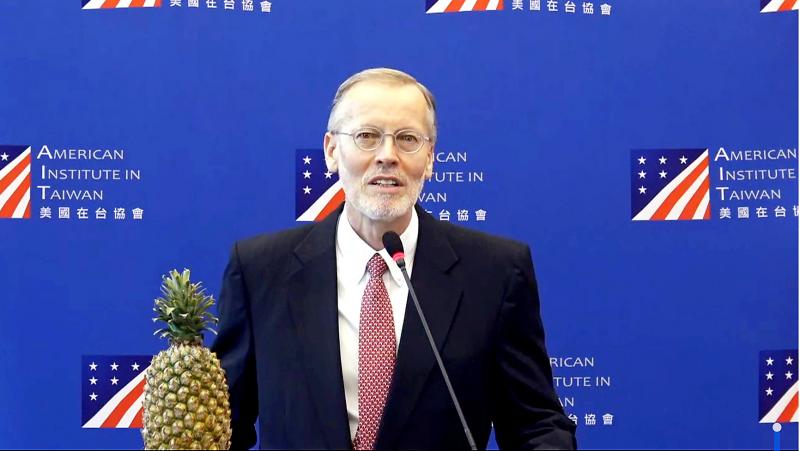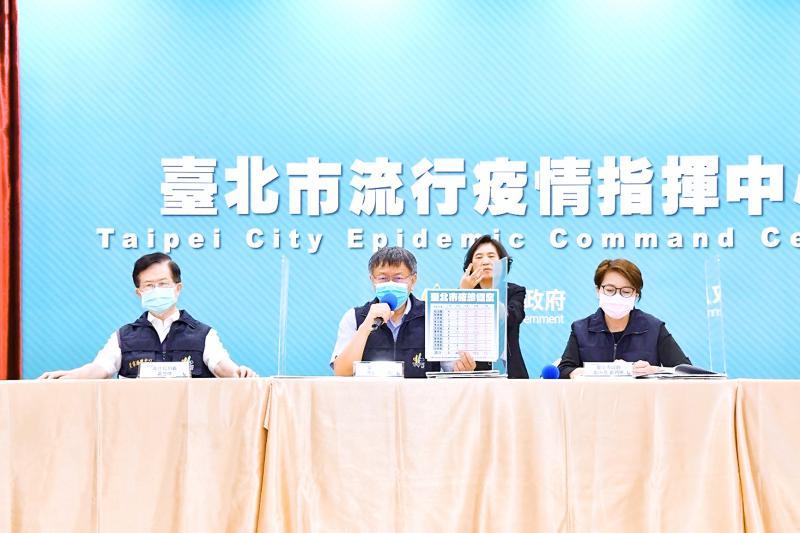The US has not yet determined its criteria for releasing COVID-19 vaccines to other countries, but it would take into consideration infection numbers, healthcare system capacity and vaccination rates, American Institute in Taiwan (AIT) Director Brent Christensen said yesterday.
Christensen made the remarks after giving a virtual farewell speech, as he is to leave his post in July after three years of service.
US President Joe Biden has said that his administration would release millions of AstraZeneca vaccine doses to other countries, but local media have expressed concerns over the US’ standards for selecting recipient nations and whether Taiwan would be among them.

Photo: Lu Yi-hsuan, Taipei Times, from an AIT livestream
Christensen lauded Taiwan’s management of the COVID-19 pandemic and said that the nation’s health authorities would certainly contain the latest outbreak.
“Many of Taiwan’s neighbors in the region are also experiencing outbreaks, while Taiwan’s infection numbers are still among the lowest in the world,” he said.
While the standards for releasing the vaccines are not yet finalized, “the level of infection in the recipient economy, the capacity of the healthcare system and the level of vaccinations” are among the criteria, Christensen said.

Photo courtesy of the Taipei City Government
Taiwan’s locally developed vaccines would also become available in the next few months, he said.
“I can assure everyone that we are engaging with Taiwan at all levels on this issue,” Christensen said.
The Central Epidemic Command Center (CECC) announced that 150,000 AstraZeneca vaccine doses would be distributed to local governments today and frontline healthcare workers who are directly exposed to infected people would have priority.
Areas with high numbers of confirmed cases would receive more vaccines, said Minister of Health and Welfare Chen Shih-chung (陳時中), who heads the center.
The CECC on Wednesday last week announced that 410,040 AstraZeneca doses had arrived via the COVAX global sharing platform, and that they would be administered following tests, which take at least a week.
Demand for COVID-19 vaccines has spiked in Taiwan, as more than 4,000 locally transmitted cases were reported over the past 10 days — a far cry from the situation over the previous few months, when the CECC repeatedly urged people to get jabs.
Chen on Tuesday announced that 2 million vaccine doses would arrive by the end of next month and 10 million doses, including locally produced ones, would be available by August.
Taipei Mayor Ko Wen-je (柯文哲) said that the capital had only two vials of vaccine, or 20 doses, and asked the CECC to consider obtaining more from other countries, as the local COVID-19 situation cannot be continued until August.
Asked about a news report that the center has modified its vaccination guidelines to allow different brands to be used in subsequent doses, Centers for Disease Control (CDC) Deputy Director-General Philip Lo (羅一鈞), deputy head of the CECC’s medical response division, said that such a change is mainly for people who have an allergic reaction after a first shot of the AstraZeneca vaccine.
The general principle is still for people to receive two shots of the same brand, Chen said.
Separately, Nantou County Commissioner Lin Ming-chen (林明溱) on Tuesday said he would use the county’s secondary reserve fund to purchase 300,000 doses of Pfizer-BioNTech’s vaccine from China’s Shanghai Fosun Pharmaceutical Group (上海復星醫藥集團) to administer to county residents, if the CECC approves the deal.
Deputy Minister of the Interior Chen Tsung-yen (陳宗彥), who is deputy head of the center, said that the CECC in a meeting yesterday once again explained the vaccine procurement procedure to local governments.
An authorized distributor must apply for a drug permit and submit documents to the Food and Drug Administration for review before a vaccine can be imported, Chen Tsung-yen said.
Vaccines are an important tool in preventing the spread of COVID-19, so distribution and administration would be coordinated by the CECC, he said.

FIREPOWER: On top of the torpedoes, the military would procure Kestrel II anti-tank weapons systems to replace aging license-produced M72 LAW launchers Taiwan is to receive US-made Mark 48 torpedoes and training simulators over the next three years, following delays that hampered the navy’s operational readiness, the Ministry of National Defense’s latest budget proposal showed. The navy next year would acquire four training simulator systems for the torpedoes and take receipt of 14 torpedoes in 2027 and 10 torpedoes in 2028, the ministry said in its budget for the next fiscal year. The torpedoes would almost certainly be utilized in the navy’s two upgraded Chien Lung-class submarines and the indigenously developed Hai Kun, should the attack sub successfully reach operational status. US President Donald Trump

TPP RALLY: The clashes occurred near the Chiang Kai-shek Memorial Hall on Saturday at a rally to mark the anniversary of a raid on former TPP chairman Ko Wen-je People who clashed with police at a Taiwan People’s Party (TPP) rally in Taipei on Saturday would be referred to prosecutors for investigation, said the Ministry of the Interior, which oversees the National Police Agency. Taipei police had collected evidence of obstruction of public officials and coercion by “disorderly” demonstrators, as well as contraventions of the Assembly and Parade Act (集會遊行法), the ministry said in a statement on Sunday. It added that amid the “severe pushing and jostling” by some demonstrators, eight police officers were injured, including one who was sent to hospital after losing consciousness, allegedly due to heat stroke. The Taipei

NO LIVERPOOL TRIP: Taiwan’s Lin Yu-ting, who won a gold medal in the boxing at the Paris Olympics, was embroiled in controversy about her gender at that event Taiwanese boxer Lin Yu-ting (林郁婷) will not attend this year’s World Boxing Championships in Liverpool, England, due to a lack of response regarding her sex tests from the organizer, World Boxing. The national boxing association on Monday said that it had submitted all required tests to World Boxing, but had not received a response as of Monday, the departure day for the championships. It said the decision for Lin to skip the championships was made to protect its athletes, ensuring they would not travel to the UK without a guarantee of participation. Lin, who won a gold medal in the women’s 57kg boxing

The US has revoked Taiwan Semiconductor Manufacturing Co’s (TSMC, 台積電) authorization to freely ship essential gear to its main Chinese chipmaking base, potentially curtailing its production capabilities at that older-generation facility. American officials recently informed TSMC of their decision to end the Taiwanese chipmaker’s so-called validated end user (VEU) status for its Nanjing site. The action mirrors steps the US took to revoke VEU designations for China facilities owned by Samsung Electronics Co and SK Hynix Inc. The waivers are set to expire in about four months. “TSMC has received notification from the US Government that our VEU authorization for TSMC Nanjing